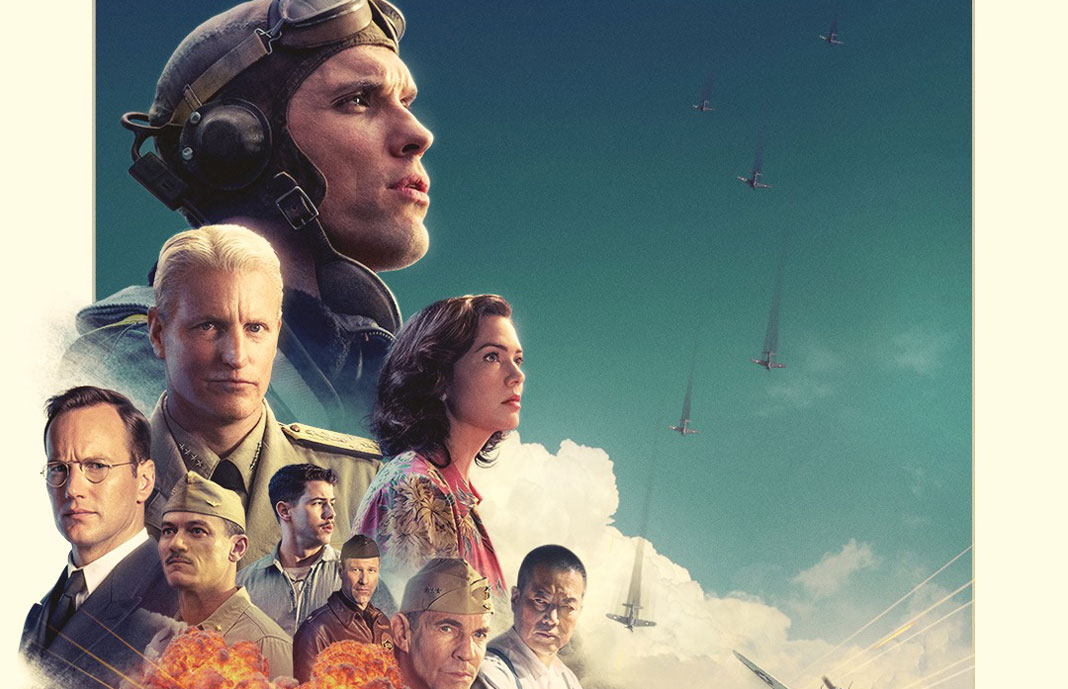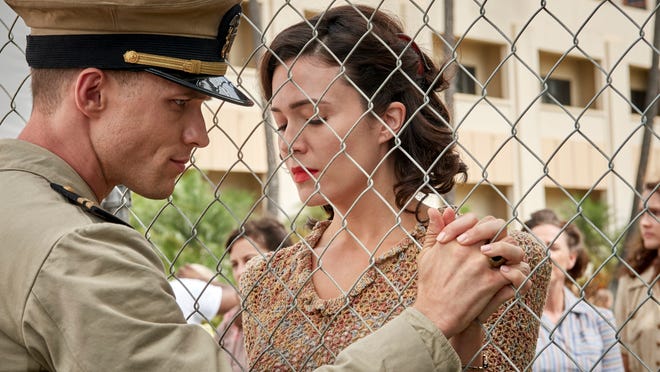Midway may be historically accurate but that means almost nothing when it lacks even an ounce of psychology and emotional gravitas. Rookie writer Wes Tooke’s screenplay feels more like a Wikipedia page than a narrative with a beating heart. Scenes just come and go in which you’re always told what’s happening — a lot happens, far too much in fact — instead of being taken on a character’s journey. You’re always told how important the goings-on are, but not once do you feel it deep within your bones. There also isn’t a gradual escalation of conflict that builds towards something meaningful. The characters that occupy the screen are played by big names and up and comers, all of whom do their best with the absolutely vapid material they’re working with. At the centre of it is Lieutenant Dick Best (Ed Skrein whose super sharp jawline will give Maleficent a run for her money), a showoff fighter pilot whose kind of a douche, loves doing “cowboy shit”, has an outstandingly thick accent and has an affinity for chewing gum. The latter is the most important character trait of his, I’m lead to believe, as Emmerich includes multiple closeups of him peeling gum of its wrapper and placing it in his mouth. There’s also Nick Jonas who has a moustache, Woody Harrelson who’s old, Dennis Quaid who suddenly gets a rash and Luke Evans who lacks even a one-word trait. The only character that’s part of an interesting throughline is Patrick Wilson’s Edwin Layton, an intelligence officer who’s intercepting Japanese comms without their knowledge. This subplot should’ve been an entire film on its own, or at the very least dissected and explored. But no, we don’t even get a proper sense of his and his unit’s struggle. These are all people at war, but none of them seem to be in any emotional, psychological or physical distress, cheesy expository lines excluded.
There’s also the comedy that does not belong. One line, in particular, that involves an American (Aaron Eckhart) trying to convince Chinese villagers that he’s on their side and not the Japanese, is laugh-out-loud funny. It’s also one-dimensional, ridiculously cheesy and tonally at odds with the rest of Midway, a “serious” historical war film. Wes Tooke’s screenplay is easily one of the year’s most uninspiring. Funnily enough, one of the great war movies of the decade, Dunkirk, also has a paper-thin screenplay with little to no character depth. But that was Nolan’s directorial clinic — A masterclass on crafting atmosphere and building sequences of heart-raising, nail-biting, edge-of-your-seat thrills, through superb set-pieces. Emmerich is no Nolan. And the action blocks we get in Midway, while never not fun, always feel like they belong in a videogame. Some of the fighter jet bombing sequences are exciting (although after a while they do feel repetitive and unimaginative), but none of them makes you feel like you’re in any form of danger.
It’s both unexpected and awesome that Roland Emmerich didn’t make Midway a completely one-sided, flag-waving, ‘f*ck the Japanese; Americans are the best’ type of movie. I believe him when he said that he read a few books on this historic, game-changing event, before working on the movie. Here, he presents the Japanese soldiers not as cruel and vile creatures, but as men who are just doing their job and serving their country. But Midway feels more like a cartoon — heck, it might’ve been better as a full-blown cartoon — in the vein of Michael Bay’s stylo but cheesier than mozzarella Pearl Harbor rather than the gruelling cinematic experience that Hacksaw Ridge provided. It is mediocre at best, but the nature of the genre makes watching mediocre action-packed war films easier to consume than mediocre dramas or mediocre romances. I know that isn’t exactly a compliment.

